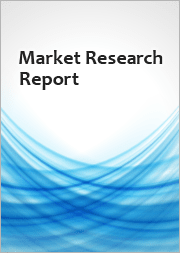
|
시장보고서
상품코드
1619086
발 교정용 깔창 : 시장 규모, 점유율, 성장 분석, 유형별, 소재별, 연령층별, 유통 채널별, 용도별, 지역별 산업 예측(2024-2031년)Foot Orthotic Insoles Market Size, Share, Growth Analysis, By Type (Prefabricated, Customized), By Material (Thermoplastics, Composite Carbon Fiber), By Age group, By Distribution Channel, By Application, By Region - Industry Forecast 2024-2031. |
||||||
발 교정용 깔창 세계 시장 규모는 2022년에 38억 4,000만 달러가 되고, 예측 기간(2024-2031년)의 CAGR은 6.4%로, 2023년의 40억 9,000만 달러에서 2031년에는 67억 2,000만 달러로 나타날 전망입니다.
발 교정용 깔창 시장은 당뇨병 발 궤양과 같은 발과 관련된 문제를 일으키는 당뇨병과 같은 만성 질환의 유병률 증가로 크게 확대되고 있습니다. 소매점의 매출과 환자의 방문수가 감소했기 때문에 시장은 혼란했지만, 장비 기술의 진보와 이러한 깔창의 유효성을 뒷받침하는 임상 연구의 충실에 의해 시장은 회복하고 있습니다. Talita Cumi Ltd.와 Aetrex Worldwide Inc.가 관여한 족저근막염 치료에 아치 서포트를 내장한 컴포트 샌들과 기존 장비를 비교한 임상시험 등 주목할 만한 연구가 수요를 견인할 것으로 예상 2020년도의 매출 침체를 거쳐, 2021년도에는 Hanger Inc.와 같은 대기업이 상당한 매출 증가를 보고하고 발 교정용 깔창의 강력한 회복의 길을 보여줍니다.
목차
소개
- 조사의 목적
- 조사 범위
- 정의
조사 방법
- 정보 조달
- 2차 데이터와 1차 데이터의 방법
- 시장 규모 예측
- 시장의 전제조건과 제한
주요 요약
- 세계 시장 전망
- 공급과 수요 동향 분석
- 부문별 기회 분석
시장 역학과 전망
- 시장 개요
- 시장 규모
- 시장 역학
- 성장 촉진요인과 기회
- 억제요인과 과제
- Porter's Five Forces 분석과 영향
- 경쟁 기업간 경쟁 관계
- 대체품의 위협
- 구매자의 협상력
- 신규 진입업자의 위협
- 공급기업의 협상력
주요 시장 인사이트
- 중요성공요인
- 경쟁도
- 주요 투자 기회
- 시장 생태계
- 고객 및 구매 기준 분석
- PESTEL 분석
- 거시경제지표
- 시장의 매력 지수
- 원재료 분석
- 가격 분석
발 교정용 깔창 시장 규모 : 유형별 및 CAGR(2024-2031년)
- 시장 개요
- 조립식
- 커스터마이즈
발 교정용 깔창 시장 규모 : 소재별 및 CAGR(2024-2031년)
- 시장 개요
- 열가소성 플라스틱
- 에틸비닐아세테이트(EVA)
- 폼
- 가죽
- 복합 탄소섬유
- 기타
발 교정용 깔창 시장 규모 : 연령층별 및 CAGR(2024-2031년)
- 시장 개요
- 성인
- 소아
발 교정용 깔창 시장 규모 : 유통 채널별 및 CAGR(2024-2031년)
- 시장 개요
- 병원 약국
- 소매점
- 온라인 스토어
발 교정용 깔창 시장 규모 : 용도별 및 CAGR(2024-2031년)
- 시장 개요
- 의료용
- 스포츠와 육상 경기용
- 개인의 쾌적성용
발 교정용 깔창 시장 규모 및 CAGR(2024-2031년)
- 북미
- 미국
- 캐나다
- 유럽
- 영국
- 독일
- 스페인
- 프랑스
- 이탈리아
- 기타 유럽
- 아시아태평양
- 중국
- 인도
- 일본
- 한국
- 기타 아시아태평양
- 라틴아메리카
- 브라질
- 기타 라틴아메리카
- 중동 및 아프리카
- GCC 국가
- 남아프리카
- 기타 중동 및 아프리카
경쟁 정보
- 상위 5개사 비교
- 주요 기업의 시장 포지셔닝(2023년)
- 주요 시장 기업이 채용한 전략
- 시장의 최근 동향
- 기업의 시장 점유율 분석(2023년)
- 주요 기업의 기업 프로파일
- 기업 개요
- 제품 포트폴리오 분석
- 부문별 점유율 분석
- 수익의 전년대비 비교(2021-2023년)
주요 기업 프로파일
- Super feet Worldwide, Inc.
- Hanger Inc.
- Implus LLC
- Aetrex Worldwide, Inc.
- Bauerfeind AG
- Ottobock SE & Co. KGaA
- Comfort fit Orthotic Labs, Inc.
- Foot Levelers, Inc.
- Solo Laboratories, Inc.
- Power step
- Vionic Group LLC
- SOLE
- Cascade Dafo, Inc.
- Reckitt Benckiser Group PLC
- Scholl Footwear Co.
- Blatchford Group Limited
- Spenco Medical Corporation
- Colfax Corporation
- Algeo Limited
- Peacocks Medical Group
결론과 권장사항
JHS 25.01.09Global Foot Orthotic Insoles Market size was valued at USD 3.84 billion in 2022 and is poised to grow from USD 4.09 billion in 2023 to USD 6.72 billion by 2031, growing at a CAGR of 6.4% during the forecast period (2024-2031).
The foot orthotic insoles market has expanded significantly due to the increasing prevalence of chronic conditions like diabetes, which lead to foot-related issues such as diabetic foot ulcers. Despite disruptions caused by the COVID-19 pandemic, which saw a decline in retail sales and patient visits, the market is rebounding thanks to advancements in orthotic technology and substantial clinical research supporting the efficacy of these insoles. Notable studies, such as a clinical trial involving Talita Cumi Ltd. and Aetrex Worldwide Inc. comparing comfort sandals with built-in arch support to traditional orthotics for treating plantar fasciitis, are expected to drive demand. Following a revenue slump in FY 2020, major players like Hanger Inc. reported significant sales growth in FY 2021, indicating a strong recovery trajectory for foot orthotic insoles.
Top-down and bottom-up approaches were used to estimate and validate the size of the Global Foot Orthotic Insoles market and to estimate the size of various other dependent submarkets. The research methodology used to estimate the market size includes the following details: The key players in the market were identified through secondary research, and their market shares in the respective regions were determined through primary and secondary research. This entire procedure includes the study of the annual and financial reports of the top market players and extensive interviews for key insights from industry leaders such as CEOs, VPs, directors, and marketing executives. All percentage shares split, and breakdowns were determined using secondary sources and verified through Primary sources. All possible parameters that affect the markets covered in this research study have been accounted for, viewed in extensive detail, verified through primary research, and analyzed to get the final quantitative and qualitative data.
Global Foot Orthotic Insoles Market Segmental Analysis
Global Foot Orthotic Insoles Market is segmented by type, material, age group, distribution channel, application, and region. Based on type, the market is segmented into prefabricated, and customized. Based on material, the market is segmented into thermoplastics, ethyl-vinyl acetate (EVA), foam, leather, composite carbon fiber, and others. Based on age group, the market is segmented into adults, and paediatrics. Based on distribution channels, the market is segmented into hospital pharmacies, retail stores, and online stores. Based on application, the market is segmented into medical, sports & athletics, and personal comfort. Based on region, the market is segmented into North America, Europe, Asia Pacific, Latin America and Middle East & Africa.
Driver of the Global Foot Orthotic Insoles Market
The Global Foot Orthotic Insoles market is primarily driven by the rising incidence of chronic foot ailments coupled with supportive reimbursement policies. Studies indicate that over 30% of the population suffers from foot pain, stemming from conditions such as arthritis, plantar fasciitis, bursitis, and diabetic foot ulcers. Medical professionals increasingly recommend foot orthotic insoles as an effective treatment. Data from the NCBI forecasted between 9.1 and 26.1 million cases of diabetic foot ulcers worldwide in 2021, with 20-25% of diabetics at risk of developing them. As diabetes prevalence reaches epidemic levels, the surge in diabetic foot ulcers significantly propels market growth worldwide.
Restraints in the Global Foot Orthotic Insoles Market
The global foot orthotic insoles market faces significant restraints, particularly due to the high costs associated with custom insoles and the limited market penetration in emerging economies. While there is a pressing need for effective orthotic solutions, their uptake in lower-middle-income countries is hampered by inadequate financial resources and service capabilities. This results in restricted demand as local practitioners often lack a variety of product options to meet patient needs. Additionally, the high price of prescription custom insoles, which can range from $400 to $600, further limits accessibility and contributes to modest market growth, ultimately hindering overall expansion.
Market Trends of the Global Foot Orthotic Insoles Market
The Global Foot Orthotic Insoles market is experiencing significant growth driven by the rising prevalence of foot-related disorders and an increasing patient demographic seeking effective treatment solutions. Key players are strategically enhancing their portfolios through mergers and acquisitions to incorporate innovative technologies, such as high-frequency and shock-absorbing materials, into their offerings. This trend reflects a shift towards personalized orthotic solutions tailored to individual patient needs, thereby enhancing overall quality of life. For instance, Thuasne's acquisition of Therafirm signifies a strategic move to enter the orthopedic prosthesis market, highlighting the industry's dynamic evolution and promising growth trajectory in the coming years.
Table of Contents
Introduction
- Objectives of the Study
- Scope of the Report
- Definitions
Research Methodology
- Information Procurement
- Secondary & Primary Data Methods
- Market Size Estimation
- Market Assumptions & Limitations
Executive Summary
- Global Market Outlook
- Supply & Demand Trend Analysis
- Segmental Opportunity Analysis
Market Dynamics & Outlook
- Market Overview
- Market Size
- Market Dynamics
- Driver & Opportunities
- Restraints & Challenges
- Porters Analysis & Impact
- Competitive rivalry
- Threat of substitute
- Bargaining power of buyers
- Threat of new entrants
- Bargaining power of suppliers
Key Market Insights
- Key Success Factors
- Degree of Competition
- Top Investment Pockets
- Market Ecosystem
- Customer & Buying Criteria Analysis
- PESTEL Analysis
- Macro-Economic Indicators
- Market Attractiveness Index
- Raw Material Analysis
- Pricing Analysis
Global Foot Orthotic Insoles Market Size by Type & CAGR (2024-2031)
- Market Overview
- Prefabricated
- Customized
Global Foot Orthotic Insoles Market Size by Material & CAGR (2024-2031)
- Market Overview
- Thermoplastics
- Ethyl-vinyl Acetate (EVA)
- Foam
- Leather
- Composite Carbon Fiber
- Others
Global Foot Orthotic Insoles Market Size by Age Group & CAGR (2024-2031)
- Market Overview
- Adults
- Pediatrics
Global Foot Orthotic Insoles Market Size by Distribution Channels & CAGR (2024-2031)
- Market Overview
- Hospital Pharmacies
- Retail Stores
- Online Stores
Global Foot Orthotic Insoles Market Size by Application & CAGR (2024-2031)
- Market Overview
- Medical
- Sports & Athletics
- Personal Comfort
Global Foot Orthotic Insoles Market Size & CAGR (2024-2031)
- North America (Type, Material, Age group, Distribution channels, Application)
- US
- Canada
- Europe (Type, Material, Age group, Distribution channels, Application)
- UK
- Germany
- Spain
- France
- Italy
- Rest of Europe
- Asia-Pacific (Type, Material, Age group, Distribution channels, Application)
- China
- India
- Japan
- South Korea
- Rest of Asia Pacific
- Latin America (Type, Material, Age group, Distribution channels, Application)
- Brazil
- Rest of Latin America
- Middle East & Africa (Type, Material, Age group, Distribution channels, Application)
- GCC Countries
- South Africa
- Rest of Middle East & Africa
Competitive Intelligence
- Top 5 Player Comparison
- Market Positioning of Key Players, 2023
- Strategies Adopted by Key Market Players
- Recent Developments in the Market
- Company Market Share Analysis, 2023
- Company Profiles of All Key Players
- Company Details
- Product Portfolio Analysis
- Company's Segmental Share Analysis
- Revenue Y-O-Y Comparison (2021-2023)
Key Company Profiles
- Super feet Worldwide, Inc.
- Company Overview
- Business Segment Overview
- Financial Updates
- Key Developments
- Hanger Inc.
- Company Overview
- Business Segment Overview
- Financial Updates
- Key Developments
- Implus LLC
- Company Overview
- Business Segment Overview
- Financial Updates
- Key Developments
- Aetrex Worldwide, Inc.
- Company Overview
- Business Segment Overview
- Financial Updates
- Key Developments
- Bauerfeind AG
- Company Overview
- Business Segment Overview
- Financial Updates
- Key Developments
- Ottobock SE & Co. KGaA
- Company Overview
- Business Segment Overview
- Financial Updates
- Key Developments
- Comfort fit Orthotic Labs, Inc.
- Company Overview
- Business Segment Overview
- Financial Updates
- Key Developments
- Foot Levelers, Inc.
- Company Overview
- Business Segment Overview
- Financial Updates
- Key Developments
- Solo Laboratories, Inc.
- Company Overview
- Business Segment Overview
- Financial Updates
- Key Developments
- Power step
- Company Overview
- Business Segment Overview
- Financial Updates
- Key Developments
- Vionic Group LLC
- Company Overview
- Business Segment Overview
- Financial Updates
- Key Developments
- SOLE
- Company Overview
- Business Segment Overview
- Financial Updates
- Key Developments
- Cascade Dafo, Inc.
- Company Overview
- Business Segment Overview
- Financial Updates
- Key Developments
- Reckitt Benckiser Group PLC
- Company Overview
- Business Segment Overview
- Financial Updates
- Key Developments
- Scholl Footwear Co.
- Company Overview
- Business Segment Overview
- Financial Updates
- Key Developments
- Blatchford Group Limited
- Company Overview
- Business Segment Overview
- Financial Updates
- Key Developments
- Spenco Medical Corporation
- Company Overview
- Business Segment Overview
- Financial Updates
- Key Developments
- Colfax Corporation
- Company Overview
- Business Segment Overview
- Financial Updates
- Key Developments
- Algeo Limited
- Company Overview
- Business Segment Overview
- Financial Updates
- Key Developments
- Peacocks Medical Group
- Company Overview
- Business Segment Overview
- Financial Updates
- Key Developments



















